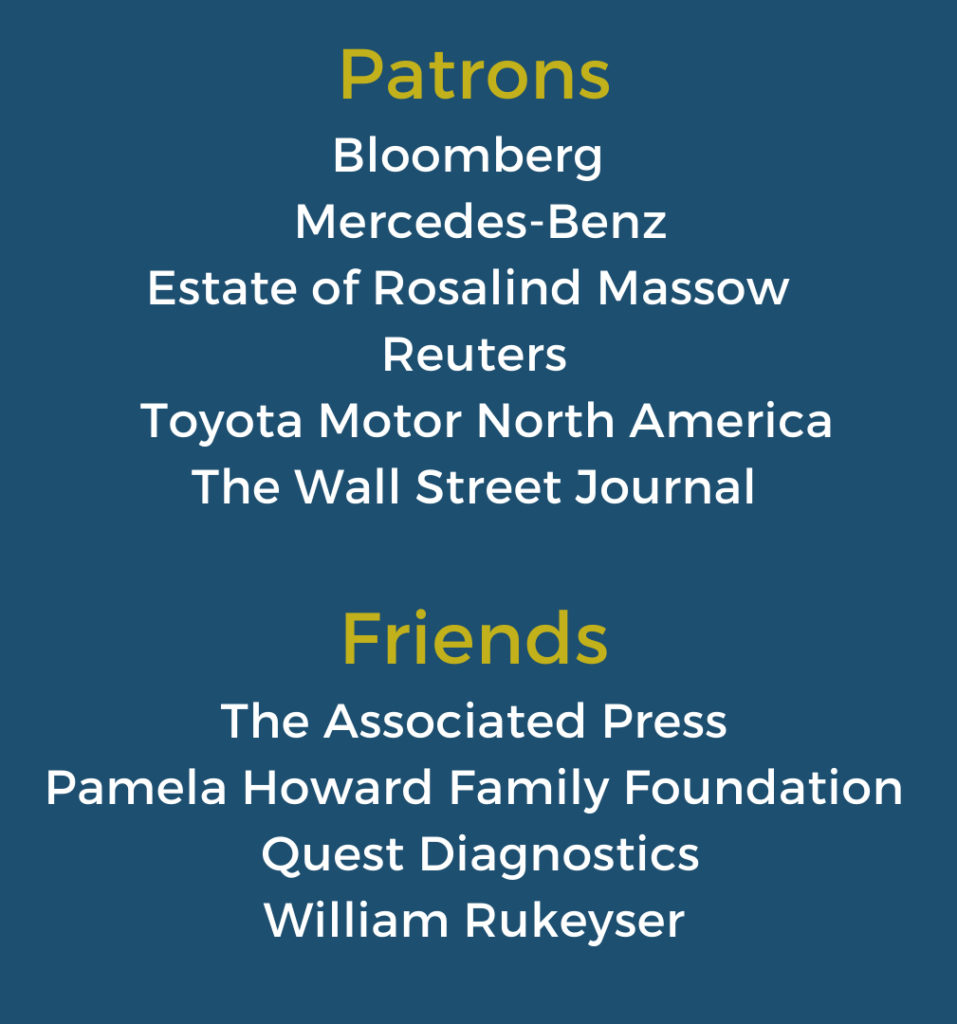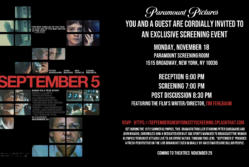Event Coverage Highlight

OPC Foundation Honors ‘Exceptionally Talented’ 2022 Scholars
by Chad Bouchard
During the OPC Foundation’s online scholarship awards celebration on May 11, William J. Holstein, the president of the foundation, hailed the talent and tenacity of this year’s 17 winners, who are facing “enormous challenges” in the early stages of their careers amid uncertainty during the COVID-19 pandemic.
“News organizations simply have not been operating their bureaus in the way they once did,” he said. Despite the disruption, Holstein noted, the foundation’s selection committee was able to find an “exceptionally talented” cohort of winners who are “finding their way into our beloved profession, one way or another.”
 This year is the second time the annual event has been held remotely.
This year is the second time the annual event has been held remotely.
The program kicked off with a recorded video presentation that included remarks from each scholar, video clips and images of their work and backgrounds.
This year’s winners included three from Columbia University Graduate School of Journalism, three from the University of California-Berkeley Graduate School of Journalism, three from New York University, two from the Craig Newmark School of Journalism at CUNY, and one each from Northwestern University, Brown University, the University of California-Santa Barbara, the University of Oxford, the University of North Carolina at Chapel Hill and American University.
Katherine Swartz, winner of the Stan Swinton Fellowship, talked about her early inspiration for learning more about the Middle East as a high school journalist in California, interviewing families from Syria that had moved to her town to escape the civil war.
“I want to tell stories through my words and documentary work, that change the way people see the world. I want to take them to places they’ll never visit themselves.”
During a semester abroad in Jordan, Swartz wrote about new technology that brought water to women refugees in a camp in Gaza. She is editor-in-chief of her college newspaper, the Daily Nexus, and has had internships with the Sacramento Bee and the Santa Barbara Independent. She has an internship this summer with USA Today in Washington DC.
Hayley Woodin, winner of the Emanuel R. Freedman Scholarship, discussed her reporting on the seven-year history of the Tahoe Resources’ Escobal mine in southern Guatemala, the world’s third largest silver mine. She said she was the first international journalist to visit the mine, where 20 protesters had been shot at by the mine’s private security.
“I believed being on the ground was critical to understanding what had happened. But in place of answers,” she said. “I found competing answers and ambiguity. I learned that Canadian companies aren’t typically held to Canadian standards abroad, and that the strength of victims’ voices can be distorted by weaknesses in our country’s judicial system.”
Woodin plans to return to Guatemala to follow up on the story. She is a business journalist and former executive editor of Business in Vancouver.
The winner of the Reuters Fellowship, Angelique Chen, talked about her reporting on the flight of Hong Kong journalists to Taiwan amid the crackdown on press freedom, and how that trend will likely improve the quality of journalism in her native Taiwan.
“That story touched upon the East Asian regional conflicts I grew up with as a Taiwanese,” she said. For the cryptocurrency and blockchain publication she currently interns for, she recently profiled the NFT artist Emily Yang, also from Taiwan, who sold an art piece for a half-million dollars in 2020 and is now philanthropy for causes dedicated to press freedom and empowering Asian Americans and Pacific Islanders. Chen has an OPC Foundation fellowship with Reuters in New York City.
The Roy Rowan Scholarship winner, Humza Jilani, a Harvard graduate who is now a Marshall Scholar at Oxford, said he spent two months in an asylum camp in Mexico near the border with Brownsville, Texas. He interviewed asylum seekers escaping violence, and recalled hearing a speech from now First Lady Jill Biden in which she condemned policies that left people languishing in the camp as “cruel,” yet that policy was reintroduced under President Joseph Biden’s term.
“I have an immense passion to continue traveling the world, to hear the voices that are often made silent or invisible, and to uplift the stories that often go untold.”
Humza has an OPC Foundation fellowship in the Reuters bureau in London.
Euan Ward, winner of the Rick Davis-Deb Amos Scholarship, talked about his experience working in Lebanon as reporter for several outlets including the Daily Star, The Guardian and CNN, and recounted the day his newsroom was devastated in the massive explosion in Beirut in 2020. “I was immediately launched from my chair under a shower of glass before the ceiling collapsed around me,” he said. “I spent the night reporting from street corners before finally passing out in my apartment stairwell at four in the morning.”
Ward has also been named the international reporting fellow for the 2022-2023 New York Times Fellowship Class.
The program also included a series of interviews with OPC Foundation scholars from past years who have recently been reporting on the Russian invasion of Ukraine. Holstein called their stories an “incredible validation of the foundation’s efforts.”
Holstein and John Daniszewski of The Associated Press, who is a board member of the foundation, interviewed Uliana Pavlova, the 2017 Theo Wilson winner and a freelance journalist formerly based in Moscow; Max Seddon, the 2012 Stan Swinton winner who recently became bureau chief for the Financial Times; and Valerie Hopkins, the 2013 Jerry Flint winner who is Moscow correspondent for The New York Times.
Pavlova, who is Russian-Ukrainian, said she feels pulled in different directions when covering this conflict.
“At some point I began to envy my colleagues who are just foreign correspondents and people who are covering this from a more distanced perspective, when it felt like I was covering the story that was also happening to me.”
She said she has seen differing reactions to the war from her family on both sides of the conflict and feels that little has been reported about the rifts the conflict and propaganda campaign inside Russia are causing. “It seems this connection that so many people had been ruined forever.”
Seddon said he and his family have not fully pulled out of Russia. He said the war has “completely ripped up the global order,” including disruption in wheat production in both countries, and oil and gas production in Russia, as well as the country’s attack on “U.S. domination of the world,” as Foreign Minister Sergey Viktorovich Lavrov stated in April.
“Whatever happens, we’re going to be dealing with the aftereffects for a long time. This is the biggest land conflict in Europe since 1945.”
Holstein asked Hopkins, who was speaking during a brief break from Cypress, how she was able to do get graphic and compelling detail remotely from places like Mariupol that had been devastated in the war. She said she had spoken to many people by phone and other means who were feeling abandoned and forgotten by the outside world.
“So it was very important to me to be able to put their stories on the front page of The New York Times, and to tell them that we do very much care, and we do know you exist, and we want you to live and thrive.”
“That kind of reporting does bring change, eventually,” Daniszewski told her.
An uncut version of the interviews has been posted on the OPC YouTube channel here.
Click the window below to watch the whole awards program.
The foundation plans to hold an in-person Scholar Awards program on Feb. 24, 2023, returning to the Yale Club for the first time since February 2020.


